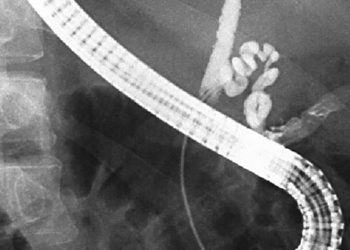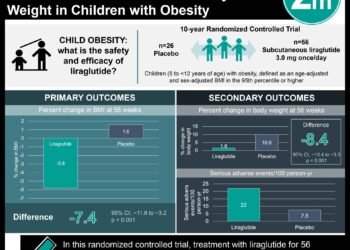Early-life program significantly improves infant weight status at 12 months
1. A program that implemented behavioral and community-level interventions at community health centers, beginning in early pregnancy, significantly decreased the percentage of infants overweight at 6 and 12 months compared to infants at control sites.
2. The size of the program’s effect on children’s weight outcomes decreased between 6 and 12 months.
Evidence Rating Level: 2 (Good)
Study Rundown: The prevalence of childhood obesity has continued to rise at an alarming pace in recent years. Few studies have examined the impact of early-life interventions on the development of childhood obesity, despite evidence suggesting that the period from birth to two years may have an important role in childhood weight. The First 1000 Days program implements systems-level interventions at 2 community health centers for women starting in early pregnancy and continues until the infant is 2 years old. It includes provider training, increased weight tracking, patient education, assistance with navigating government resources, and individualized coaching. This study examined outcomes of the program up until the infant’s first year of life. Relative to women and infants receiving standard care, those in the program had lower weight-for-length and lower odds of being overweight at 6 months and 12 months of age. The magnitude of these differences was smaller at 12 months than at 6 months. The study program was innovative in enrolling mothers early in pregnancy and in incorporating public health services as well as training and involving providers across several disciplines. However, the many-pronged approach of this program design might make replication in other healthcare settings challenging. Additionally, lack of randomization places the study at high risk of selection bias, with more motivated families potentially enrolling in the program. The duration of the program effect on weight outcomes at 2 years of age and throughout childhood is unknown at this time.
Click to read the study in Pediatrics
Relevant Reading: From conception to infancy — early risk factors for childhood obesity
In-Depth [prospective cohort]: This quasi-experimental study did not randomize or blind patients to the study interventions. Mothers were enrolled in the First 1000 Days program during the first trimester of pregnancy and received program interventions throughout pregnancy and until their children were 2 years old. The intervention and comparison health centers, all in the Boston area, serve patients who are disproportionately low-income and Hispanic. Data from birth to age 15 months was collected using the electronic health record. In a model adjusted for between-site differences in infant race and ethnicity, public insurance status, and birth weight, infants enrolled in the program had an average weight-for-length z score -0.27 lower than the control group at 6 months and -0.18 lower at 12 months. The odds of being overweight, defined as weight-for-length > 97.7th percentile, at 6 months in the intervention versus control group were 0.46 (95% CI 0.28 to 0.76), but increased to 0.60 (CI 0.39 to 0.92) at 12 months. Mothers at program sites were more likely to complete a postpartum visit than those at control sites, but no significant effect on postpartum weight retention was observed.
Image: PD
©2021 2 Minute Medicine, Inc. All rights reserved. No works may be reproduced without expressed written consent from 2 Minute Medicine, Inc. Inquire about licensing here. No article should be construed as medical advice and is not intended as such by the authors or by 2 Minute Medicine, Inc.




![Active smoking cessation intervention may provide tangible results [Project CLIQ]](https://www.2minutemedicine.com/wp-content/uploads/2014/12/smoking-e1418644951268-350x250.jpg)


